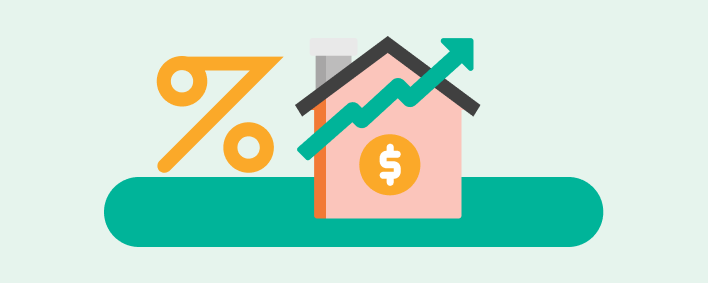Our goal is to give you the tools and confidence you need to improve your finances. Although we receive compensation from our partner lenders, whom we will always identify, all opinions are our own. Credible Operations, Inc. NMLS # 1681276, is referred to here as "Credible."

Credible Operations, Inc. NMLS# 1681276, “Credible.” Not available in all states. www.nmlsconsumeraccess.org.
The past two years have been interesting for anyone paying attention to mortgage interest rates. Rates dropped steadily in 2020 after the Federal Reserve lowered the federal funds rate in response to the COVID-19 pandemic. Since that time, they’ve inched up but remain low.
What can homeowners and prospective homebuyers expect in 2022? We asked three mortgage experts for their mortgage interest rate forecast for the coming year. Spoiler alert: If you’re thinking about refinancing, you might want to get started sooner rather than later.
Credible makes it easy to compare mortgage refinance rates from multiple lenders.
The current state of mortgage interest rates
For the week ending Nov. 29, 2021, the average rate on a 30-year fixed-rate mortgage was 3.11%, according to Freddie Mac. That’s up slightly from 2.72% for the same week in 2020, but still very low.
Despite low rates, high home prices have discouraged many homebuyers. Home prices increased 18% from September 2020 to September 2021, according to data analysis company CoreLogic.
Of course, rising home prices can be good news for homeowners looking to refinance. Homeowners in the U.S. can and have taken advantage of the low interest rate environment. Around $1.6 trillion first-lien refinance originations occurred in the first half of 2021, Freddie Mac reports. That’s a 33% increase in refinancing activity compared to the first half of 2020.
Mortgage interest rate forecast for 2022
With 2021 coming to a close, many prospective homebuyers and existing homeowners are interested in the mortgage interest rate forecast for 2022. Should they try to close on a purchase or refi before year-end? Do they have time before interest rates rise? Or will interest rates fall again next year?
Of course, it’s impossible to predict with 100% certainty without a crystal ball, but here’s a look at some possible scenarios.
Forecast 1: Mortgage interest rates will hold steady in 2022
Linda McCoy, president of the National Association of Mortgage Brokers, predicts that mortgage rates will stay the same through the end of the second quarter of 2022.
“We know that refis are slowing down, and everything has slowed down a touch,” McCoy says. “But there are still people moving out of smaller houses to get into bigger houses. So the housing market is still moving, just not as fast as it has been.”
Despite pressure from inflation, McCoy believes rates will hold.
“If rates went up, it would hurt low- to moderate-income borrowers,” McCoy says. “The Fed is very focused on them.”
You can compare mortgage refinance rates from multiple lenders and learn more about how mortgage refinancing works at Credible.com.
Forecast 2: Mortgage interest rates will rise slowly
Nadia Evangelou, senior economist and director of forecasting at the National Association of REALTORS®, expects interest rates will continue to rise in the year ahead, largely due to inflation.
“Inflation rose to its highest since 1990,” Evangelou says. “When inflation rises, lenders ask for higher interest rates as compensation for the decrease in purchasing power. Thus, if inflation remains elevated for a longer period, that will drift up mortgage rates.”
Evangelou expects the Fed to raise interest rates in order to combat inflation as well. “In fact, the Fed is expected to do that by the first half of 2022 in order to control elevated inflation,” Evangelou says. “This strategy will push up rates even further.”
“Finally, another factor that will lead to higher mortgage rates is Fed’s tapering which is about to start,” she says. “With the Fed slowly reducing its monthly bond purchases, bond yields will move up as the supply of these bonds will increase in the broader economy and bond prices will drop. Following the trend of the 10-year Treasury yield, mortgage rates will go up as well.”
As a result, Evangelou expects rates on 30-year fixed-rate mortgages to average 3.3% in the first quarter of 2022 and 3.5% for all of 2022.
That’s not a huge jump from where rates are now, which Evangelou attributes to the jobs outlook. “The economy is still recovering, missing nearly 4 million jobs,” Evangelou says. “Hence, consumers shouldn’t panic. Even with this increase, mortgage rates will be slow.”
Forecast 3: Mortgage interest rates will be volatile in 2022
Melissa Cohn, regional vice president at William Raveis Mortgage, says several factors are at odds with each other in the economy, which will create a lot of “push me, pull you” with rates in 2022.
“The Fed pledged they’ll start tapering bond purchases late this month to fight inflation,” Cohn says. “That will theoretically send rates higher.”
However, she predicts the pandemic will continue to have an impact on mortgage rates. “Medical experts are saying we’re still far away from herd immunity,” Cohn says, “so people going indoors for the winter and returning to offices could create another COVID-19 wave. That would be detrimental to the economy and bring rates down.”
Cohn predicts rates will be volatile within a quarter to half a percentage point range in the next six months to a year.
“The economy is still pretty tenuous,” Cohn says. “And I don’t believe it can withstand much higher rates. At some point, mortgage rates will go up, but probably not until the end of next year. The fourth quarter of 2022 is when we’ll see the bulk of rate increases.”
What this could mean for borrowers
If interest rates do rise in 2022, we’ll likely see a drop in refinance demand. And higher mortgage interest rates combined with high home prices would likely put off prospective homebuyers — especially those purchasing for the first time.
Mortgage rates frequently asked questions
How does the Federal Reserve affect mortgage interest rates?
The Federal Reserve does influence mortgage rates, but the two aren’t directly linked. The Fed sets the federal funds rate, which is the rate at which banks borrow and lend money to each other, usually on an overnight basis. Each time the Fed meets, it issues a press release highlighting committee members’ views on the economy. If their position is generally positive, mortgage rates tend to rise. When their outlook is negative, mortgage rates tend to fall.
What makes mortgage interest rates change?
Several factors, including inflation, consumer spending, the employment rate, and the overall housing market, influence mortgage rates along with the Fed’s decisions on the federal funds rate. When the economy is healthy and growing, demand for mortgages tends to go up, and mortgage rates go up with it.
What is a good mortgage rate?
A “good” mortgage rate depends on the average rates when you take out a mortgage. The lowest historical mortgage rates were in January of 2021, when the average rate on a 30-year fixed-rate mortgage was 2.65%. But not everyone buying a home or refinancing that month received such a low rate. Individual circumstances, such as your credit score, the home’s location, home price, loan amount and term, and the size of your down payment, impact the rate you qualify for.
What credit score do I need to get a mortgage?
The minimum credit score to get a mortgage depends on the type of loan you’re looking for. For conventional loans, the minimum FICO score is usually 620, although some lenders may have higher minimums.
For loans backed by the Federal Housing Administration (FHA), the minimum credit score is 500. However, applicants with credit scores below 580 must come up with a larger down payment (10% versus the 3.5% rate available to borrowers with credit scores of 580 or above).
How can I lock in a low mortgage rate?
Some lenders allow you to lock in a mortgage rate before your loan closes — usually for a period of 30 to 60 days. If rates go up during this time, your rate won’t go up with them. However, some lenders charge a fee to lock in a rate. Also, if rates drop after you lock in your rate, you may lose out on the lower rates unless you pay extra for a “float-down” option, which allows you to switch to a lower rate after you’re locked in.
To compare mortgage refinance rates and see actual prequalified rates from multiple lenders, visit Credible.
About the author: Janet Berry-Johnson is an authority on income taxes and small business accounting. She was a CPA for over 12 years and has been a personal finance writer for more than five years. Janet has written for several well-known media outlets, including The New York Times, Forbes, Business Insider and Credit Karma. In 2021, Canopy named her one of the Top 10 Influential Women in Accounting and Tax.

